Workshop: Action Research with Columinity
A hands-on one-day workshop to use a collaborative, data-informed approach for continuous improvement and meaningful systemic change.
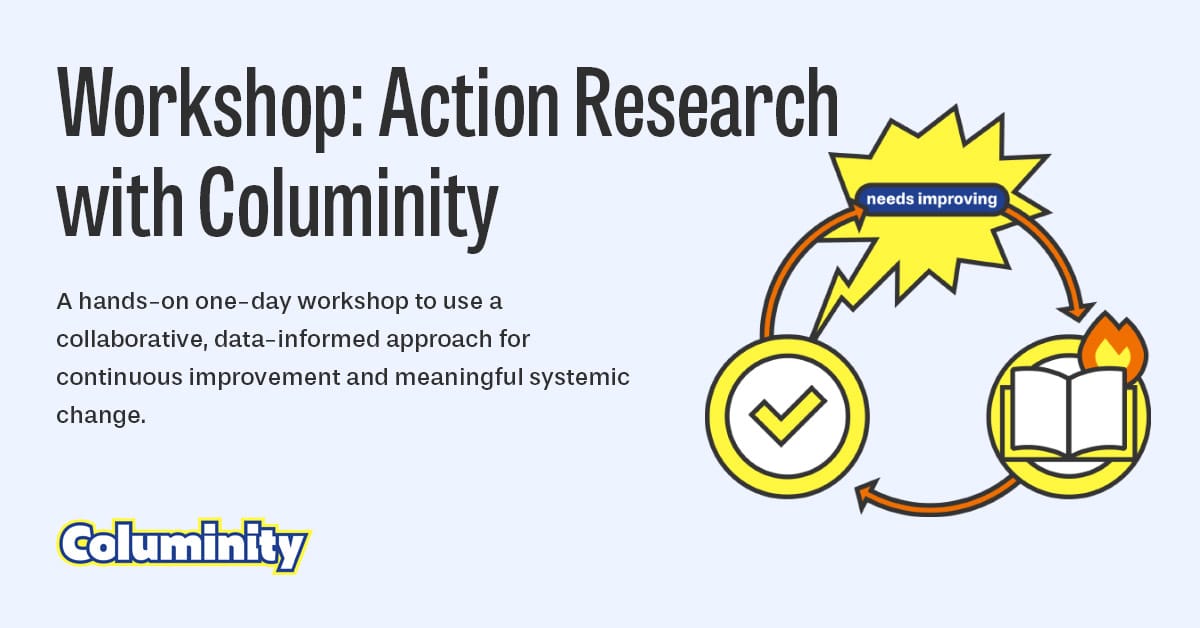
Columinity isn’t just a tool to scan your team—it’s a robust, systematic approach to analyzing your organization, identifying improvements together, and creating lasting change grounded in scientific insights. That’s Action Research in a nutshell—the foundation of Columinity. We’re excited to see more organizations recognizing this and taking the leap with their teams.
In this blog post, we introduce the concept behind Action Research with Columinity and outline our 1-day workshop, shaped by real sessions we've run with clients. Ideally, everyone with a stake in solving a problem or improving a process is involved. In the context of Columinity, that means team members, stakeholders (like users and customers), and those supporting the teams: leaders, managers, and coaches.
The flow of the workshop is never precisely the same—this outline is meant to give you a rough idea of what it could look like. For some clients, we’ve run a focused 4-hour session; for others, a full-day workshop or even a 2-day deep dive. While the format and duration vary, the outline offers a general sense of how the workshop typically unfolds. We've found that repeating the workshop—whether with or without our support—adds real value. It helps teams build momentum, reflect on progress, and continuously adapt based on new insights.
Sounds interesting? We offer facilitated Action Research workshops to help teams and organizations diagnose results, identify actionable improvements, and evaluate progress. Contact us (info@columinity.com) to explore the possibilities.
👉 Download the free digital Columinity Poster Package and start using our materials to improve your team and organization.

Part 1 - Action Research explained
Timeslot: 9:00 - 9:30
After encouraging participants to make their first connections, we run a couple of exercises to explore and explain Action Research. In short, Action Research is a collaborative, data-informed process for identifying challenges, taking action, and reflecting on results to spark continuous improvement and learning. It isn’t a framework or methodology—it’s a way of approaching systemic change.
It starts with a problem or process participants want to improve. Together, they diagnose the situation by collecting and interpreting data and identifying patterns that point to deeper causes. Based on these insights, they formulate hypotheses and define concrete actions they believe could make a meaningful difference. They also decide how to evaluate whether those actions are working—what to measure, how to measure it, and what factors might influence the outcome.
These steps form a continuous, non-linear cycle. Our workshop guides teams through this cycle, helping them move forward with clarity and confidence. To dive deeper into Action Research, check out this article by Christiaan Verwijs.
While Action Research can be used at the team level, it becomes truly powerful when applied at a broader scale. Many of today’s team challenges extend beyond a single team and relate to leadership, strategy, culture, or inter-team dependencies. Focusing solely on individual teams can lead to local improvements but also to suboptimal outcomes.
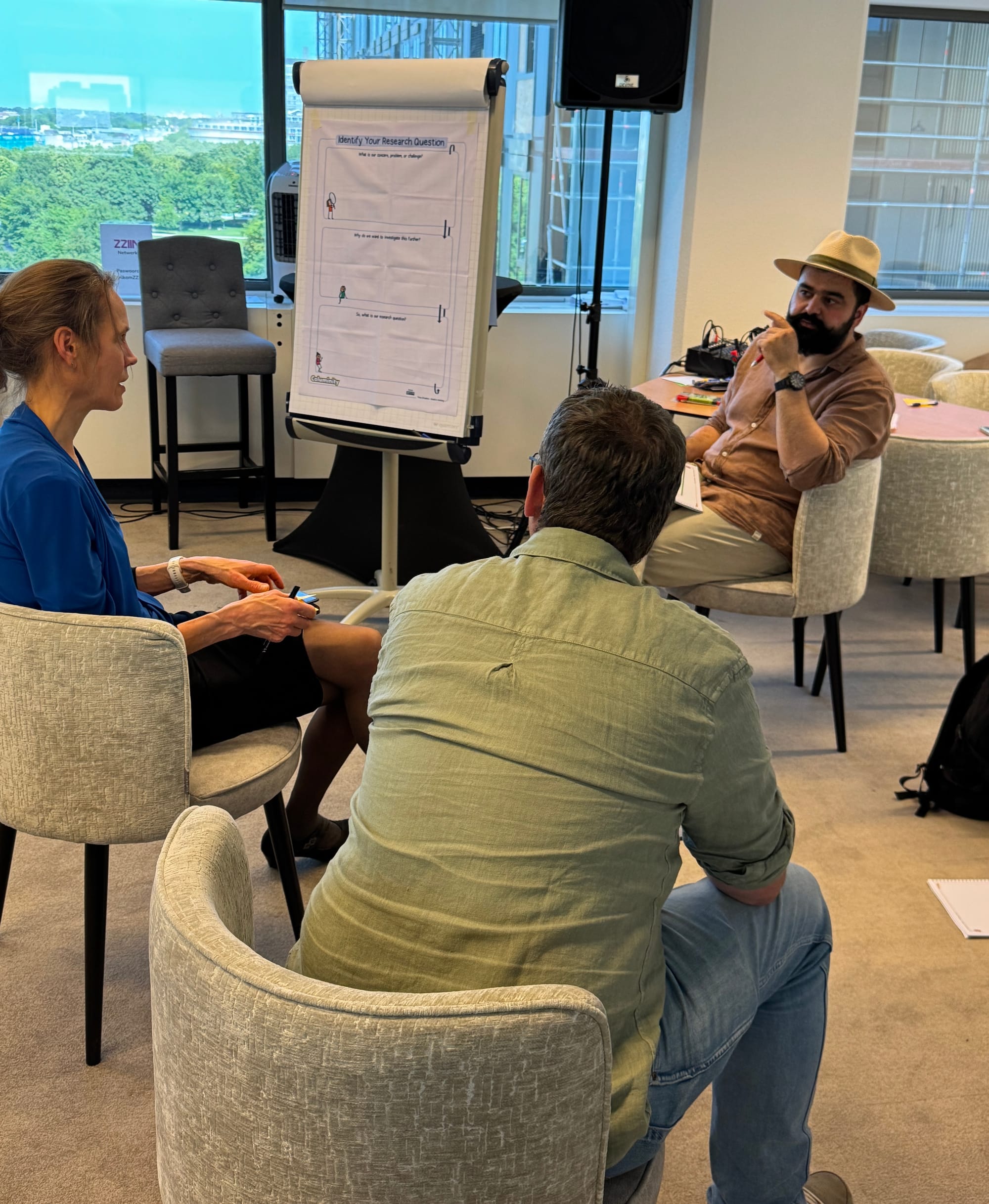
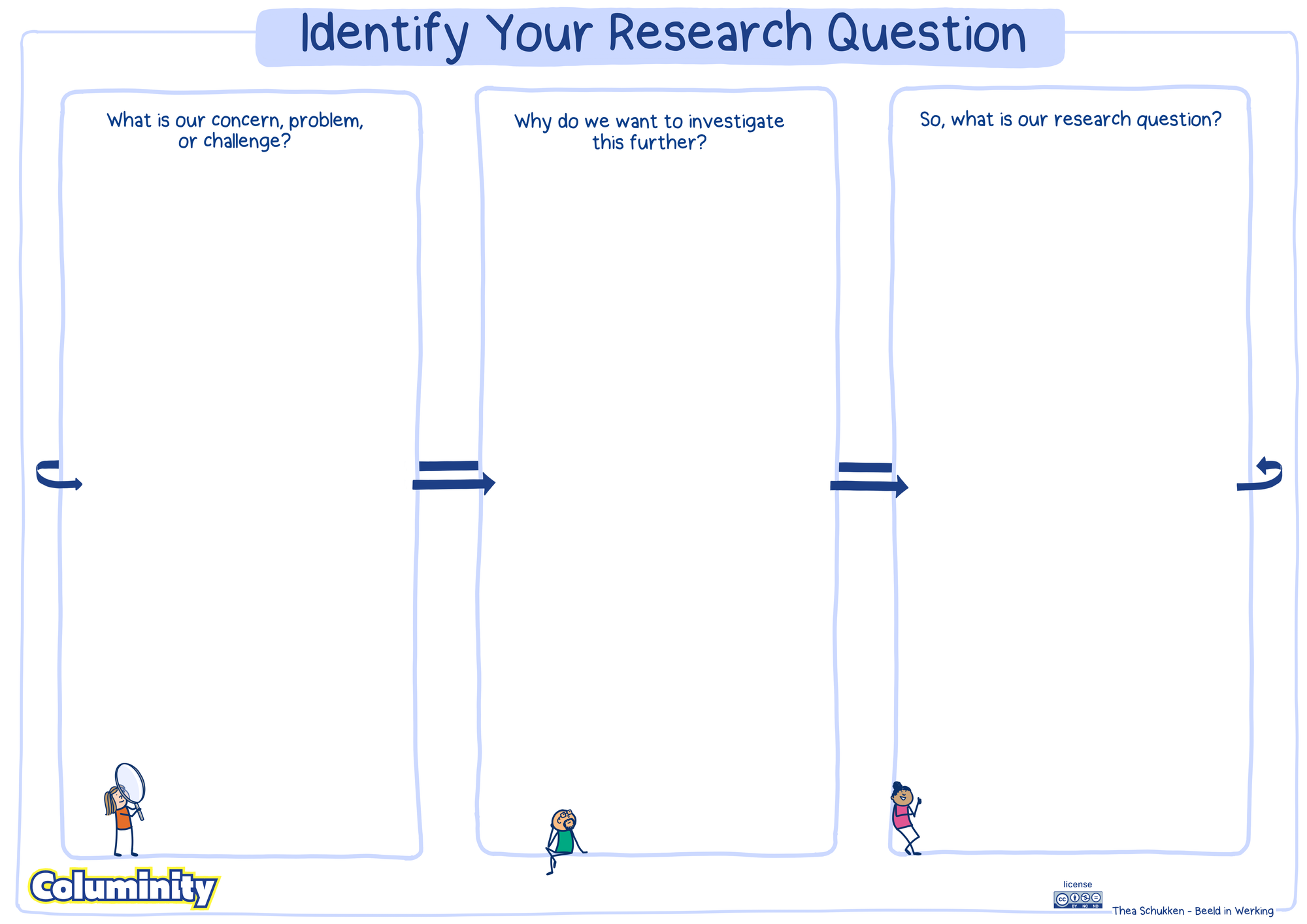
Part 2- Identify your research question
Timeslot: 9:30 - 10:00
The starting point is to identify your research question—an open-ended prompt about a concern, challenge, or curiosity you want to explore together. And just as important: what would you expect to see in the data if this were actually happening? Some examples:
- Why is our profit declining, even though our revenue is steady and our teams seem busy?
- We’re concerned our teams aren’t productive—how can we validate whether that’s true and if it’s something that actually needs improvement?
- How can we scale our company without introducing excessive complexity for our teams?
- What’s behind the high turnover in some of our teams—and how can we understand what’s really driving people to leave?
- Why are some of our stakeholders increasingly dissatisfied—and what might be contributing to that?
If you don’t have a clear research question yet, no problem. Start by running a complete Columinity questionnaire—the results will likely reveal patterns or challenges worth digging into. For example, if several teams struggle with a “value focus,” that could be a good starting point. It also works the other way around: if a concern you had upfront doesn’t show up in the data, maybe it’s not as urgent as you thought.
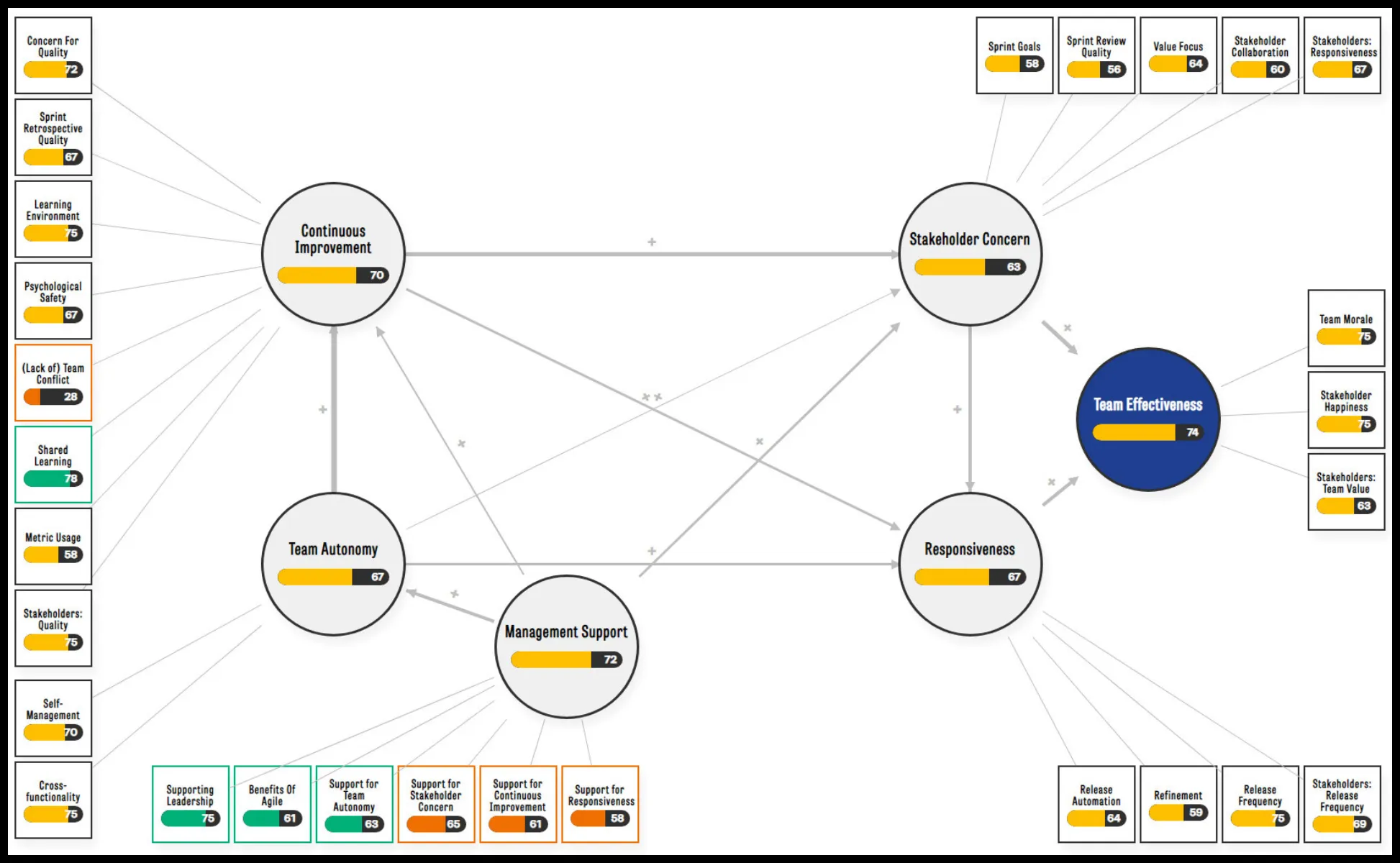
Part 3 - Diagnose
Timeslot: 10:00 - 12:00
We collect and interpret data, bringing together diverse perspectives to build a deeper understanding of the team's performance. We look for what stands out—surprising results, strong signals, or silent gaps that raise questions. Together, we explore how these observations connect and what story the data might be telling. As themes emerge, we begin to see patterns that point to underlying causes or areas that could benefit from change. This shared sense-making helps shift the focus from isolated symptoms to more systemic insights.
Note that in Action Research, you don’t have to limit yourself to one source, like Columinity, for example. Insights can come from anywhere: feedback, conversations, observations, even those everyday tensions you’ve noticed but haven’t named yet. The goal is to bring together various types of information to create a richer and more comprehensive understanding of what is really happening. The more sources you draw from, the better. That said, Columinity is a great place to start!
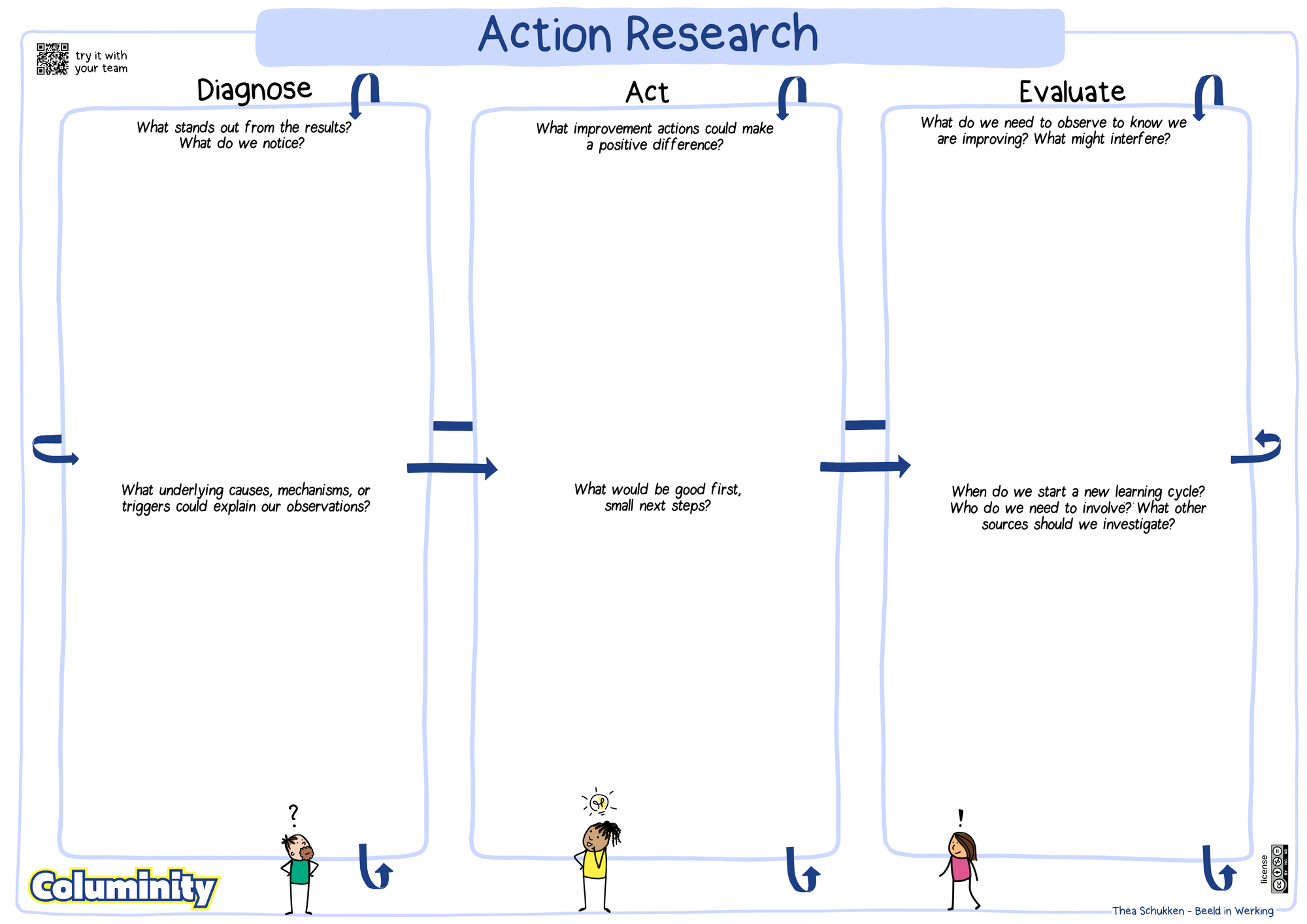
What stands out from the results? What do we notice?
- "There’s a noticeable drop—24 points—in how people perceive management support since the last round."
- "Psychological safety is showing up as a clear concern—it's even listed as an impediment."
- "We’re seeing that most teams didn’t invite any stakeholders to respond—what might be behind that?"
After noticing standout results or surprising data points, we step back to identify patterns and relationships. This shift enables us to transition from isolated observations to a more comprehensive understanding of how various factors may be interconnected.
What are patterns and connections?
- "There seems to be a barrier that’s keeping teams from involving their stakeholders—what could that be?"
- "Low psychological safety and weak management support are showing up together—could there be a connection?"
- "Teams with unclear or weak shared goals also report low morale—perhaps one is influencing the other?"
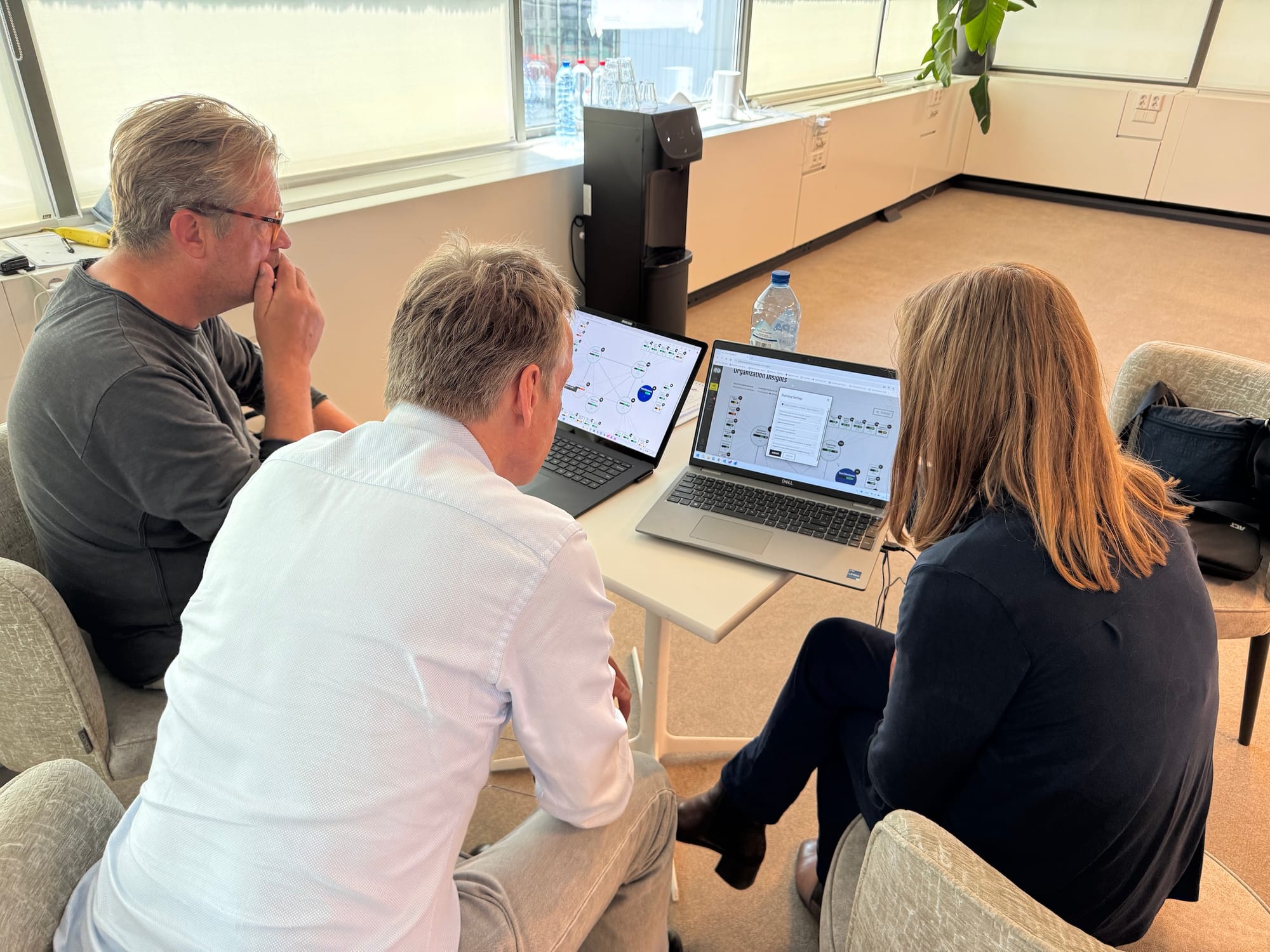
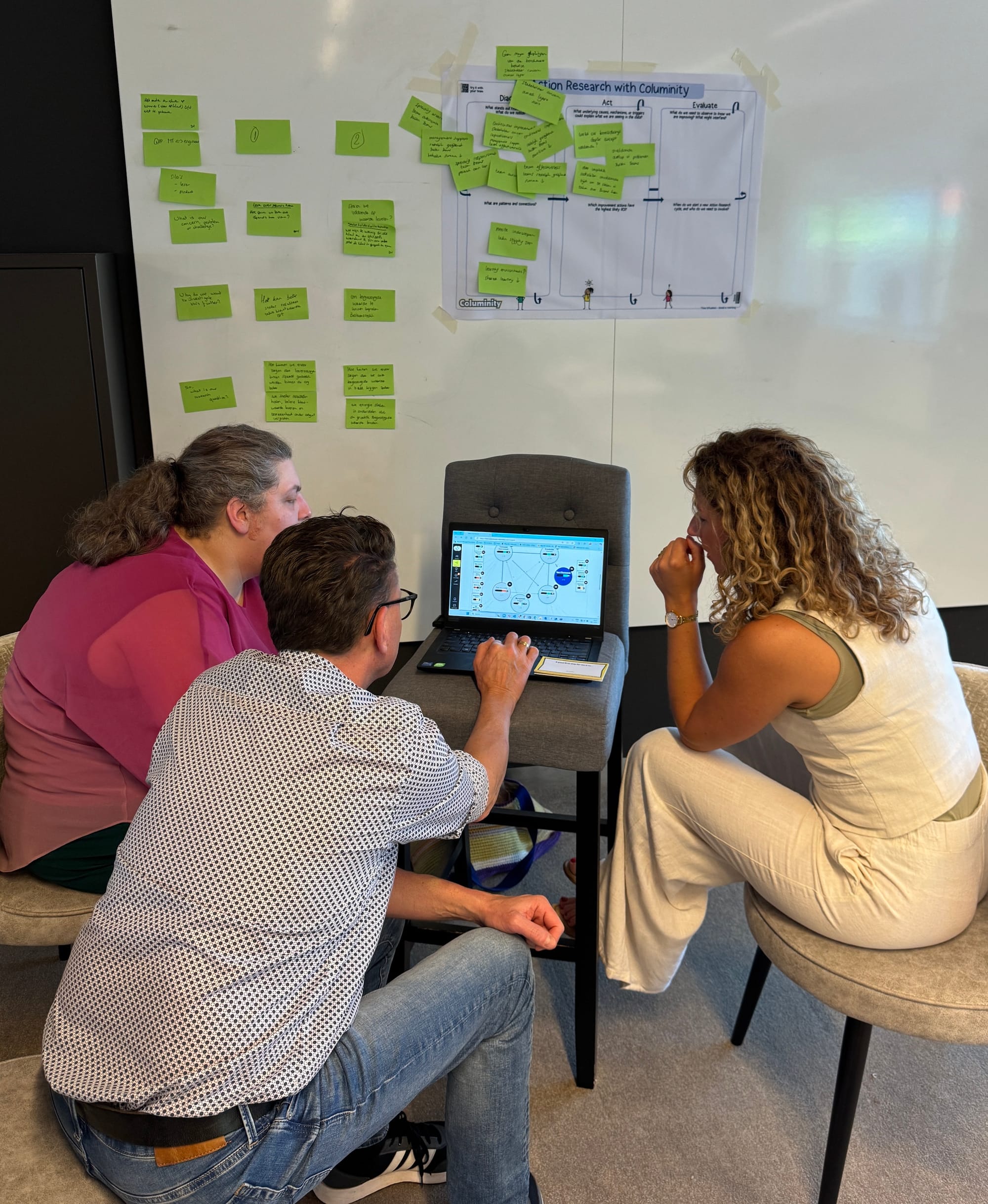
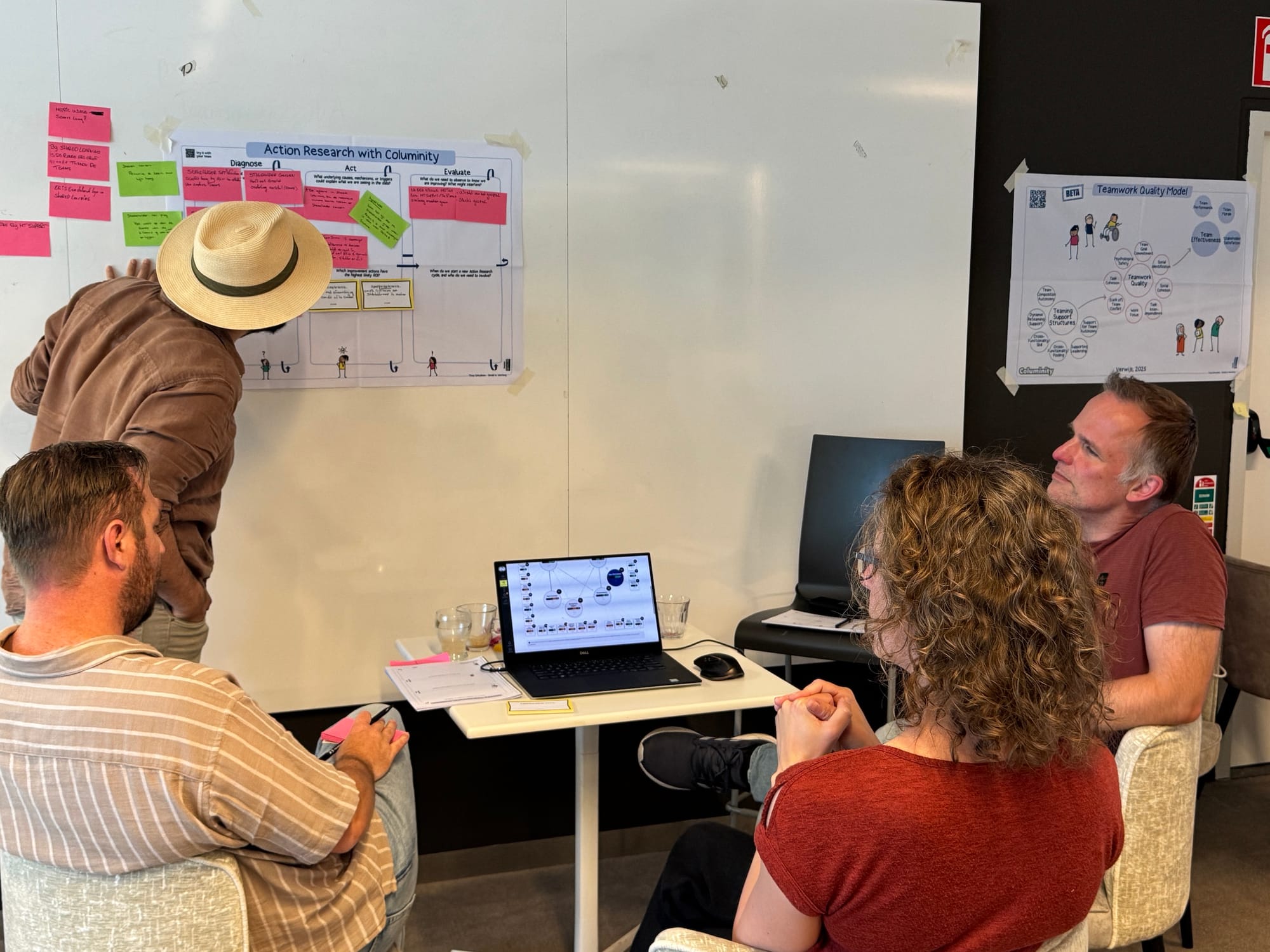
Impressions of a diagnoses workshop we facilitated at Wigo4IT.
Part 4 - Act
Timeslot: 13:00 - 14:30
Next, we formulate hypotheses about what might be driving the patterns we’ve uncovered. We reflect on possible root causes and explore which ones seem most plausible in our specific context. What might be causing these patterns? What’s going on beneath the surface? With those insights, we brainstorm improvement actions that could lead to meaningful change. The focus is on practicality and impact—what small or strategic shifts might offer the greatest return on effort? This step turns insight into intention, bridging reflection and action.
What underlying causes, mechanisms, or triggers could explain what we're seeing in the data?
- "Some teams may avoid involving stakeholders because they fear criticism or feel exposed, as it may seem risky or uncomfortable."
- "Perhaps inconsistent or absent management support signals that speaking up isn’t safe, which could be lowering psychological safety."
- "Unclear or misaligned goals might be creating confusion and frustration—this could be what’s dragging down team morale."
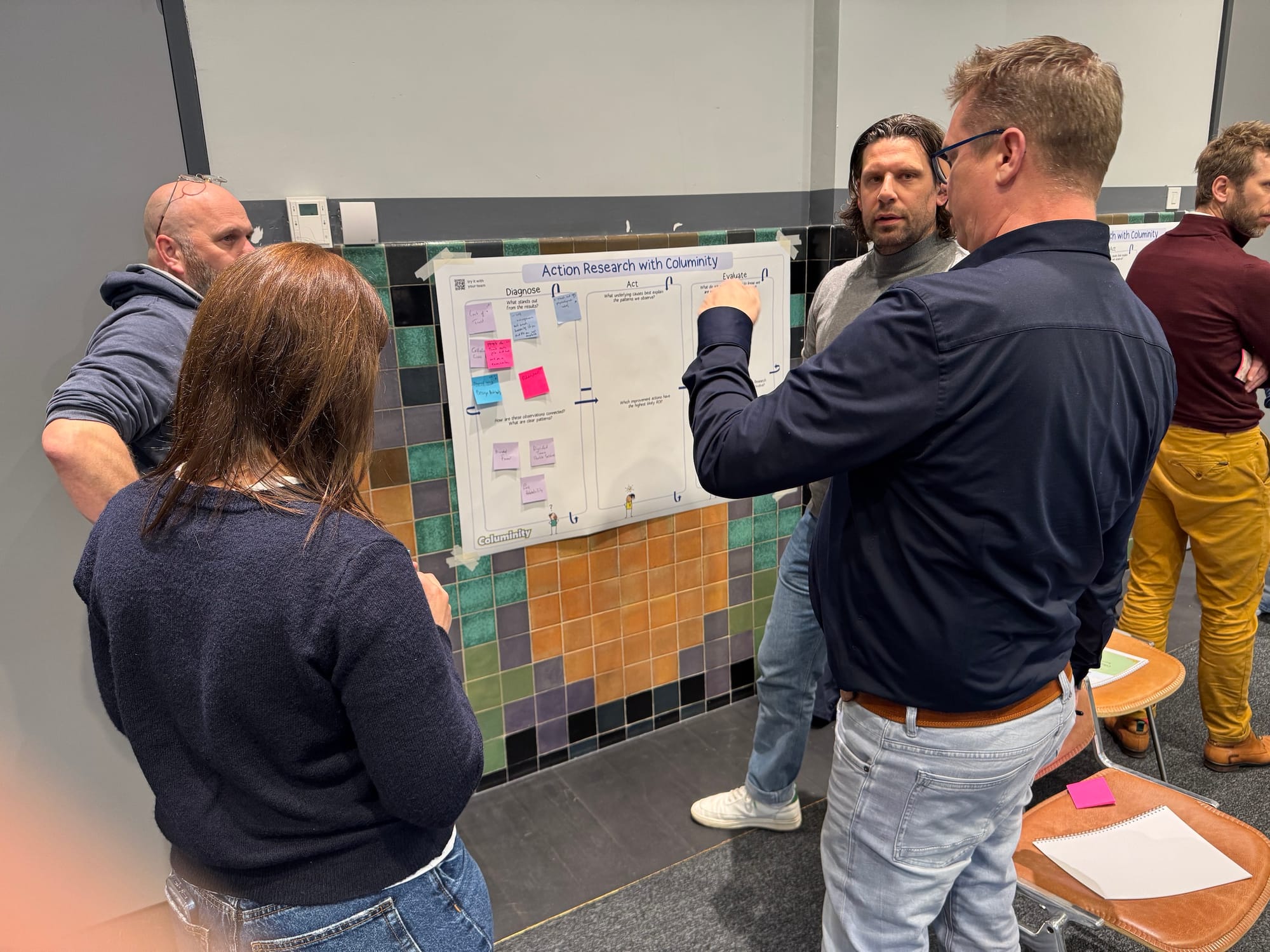
Which improvement actions have the highest likely ROI?
- "Ask your key stakeholders what they believe the goal of your next iteration should be. If the answers are vague or too broad, work together to sharpen the focus."
- "Reflect together: when have we felt supported by leadership? What did that look like, and how did it affect us?"
- "In your next iteration, agree as a team to politely decline non-critical requests that don’t align with the shared goal."
To help teams move from vague intentions to practical improvement, we created a simple canvas with six guiding questions. It begins by identifying a concrete improvement action, followed by choosing the type of action—for example, initiate a conversation, request help outside the team, run an experiment, research options, facilitate a workshop, or something else.
Teams then reflect on which factors they expect to improve, what support they need from others, who is responsible for the action, and when it should be completed. The goal is to focus on small, meaningful steps that are both realistic and impactful. This canvas aligns with the actions page in Columinity, making it easy to add actions directly to the platform afterward.
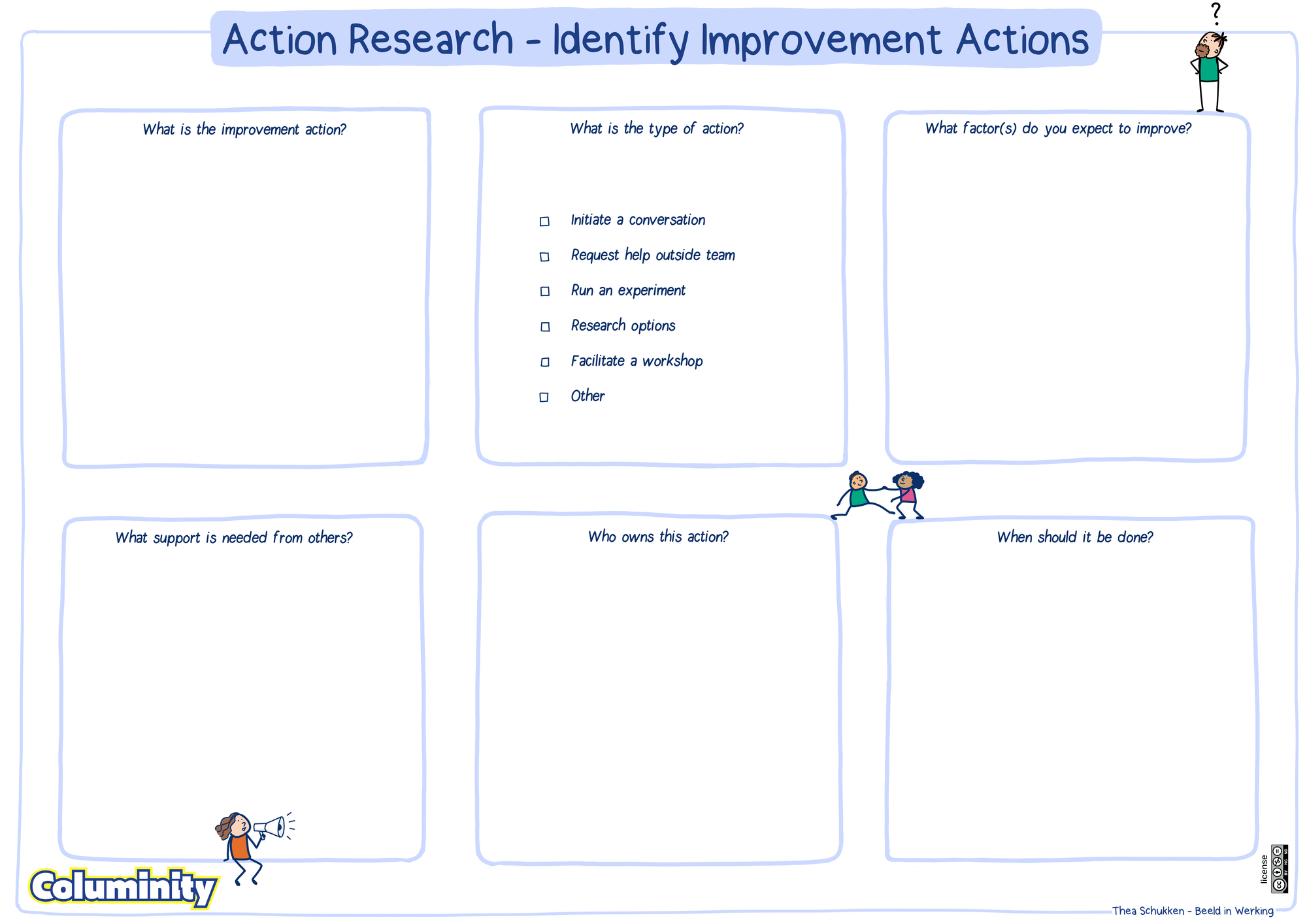
Part 5 - Evaluate
Timeslot: 14:30 - 15:30
Next, we define how we'll evaluate whether our improvements are making a difference. We discuss what data or signals we'll need to confirm—or challenge—our hypotheses. To avoid drawing false conclusions, we also consider potential pitfalls, such as biased input, shifting team dynamics, or external influences. We agree on when to review progress and whether it might be time to begin a new Action Research cycle. Finally, we identify who else should be involved—whether to help collect data, offer perspective, or provide support—to keep the learning going.
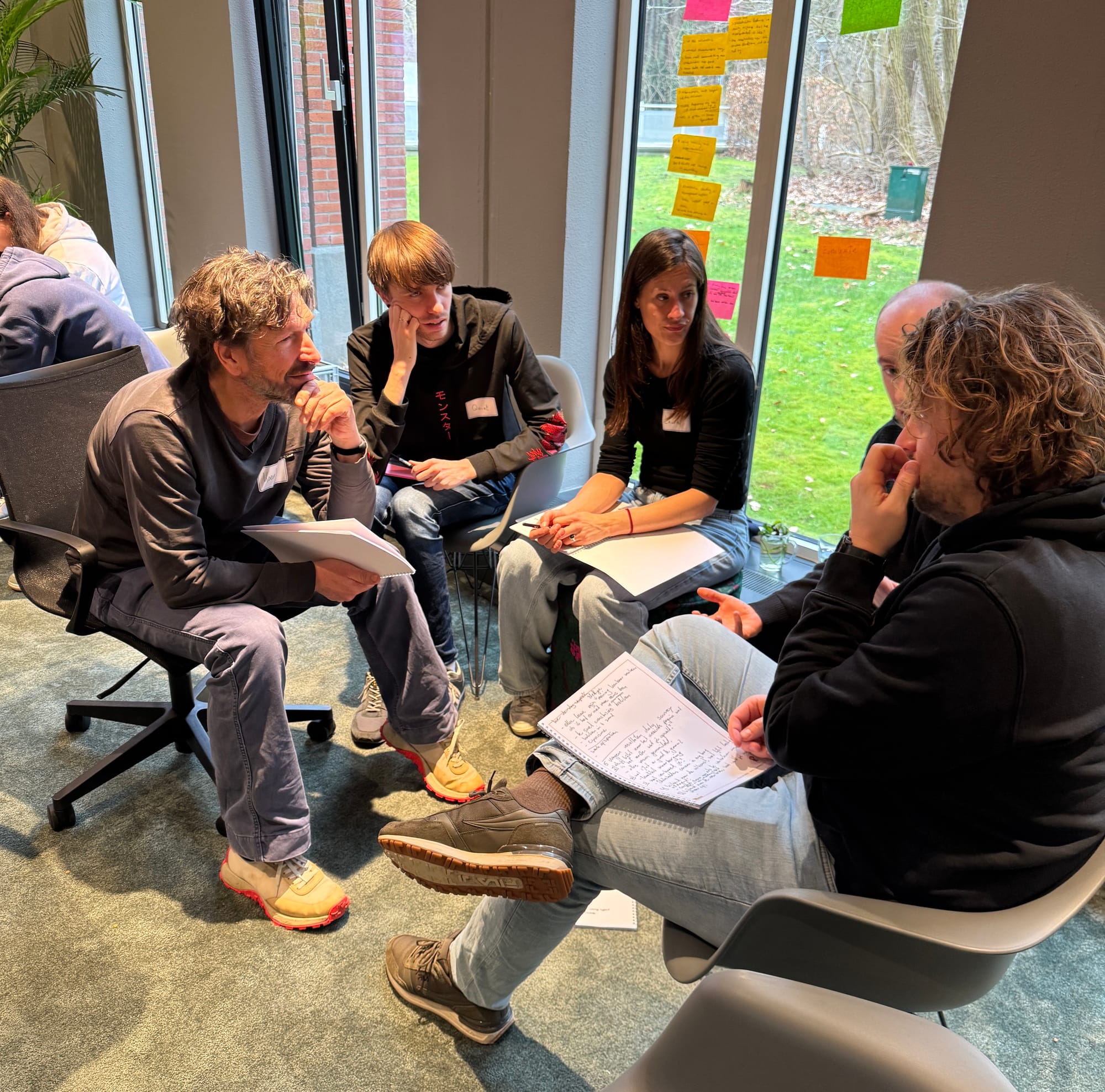
What do we need to observe to know we are improving? What might interfere?
- "Stakeholders are being invited regularly and on time."
- "Team members can clearly and consistently state the team’s current goal—without hesitation or conflicting answers."
- "Teams proactively raise issues or concerns in meetings, rather than waiting for them to escalate."
When do we start a new Action Research cycle?
"To keep learning and improving, it’s important to regularly revisit our data and reflect on what’s changing. We’ve decided to begin our next Action Research cycle in three months. In the meantime, we’ll maintain our rhythm: completing the full questionnaire quarterly and checking in on a subset of factors every two weeks. This helps us stay attuned to progress, without overloading the teams."
Who do we need to involve?
"For this cycle, we’re involving Manager X, Stakeholder Y, and Coach Z from the start. We’ve also invited teams ABC and DEF to join the questionnaire—they’ve been doing interesting work, and we believe their perspectives will enrich the overall picture."
Part 6 - Moving forward
Timeslot: 15:30 - 16:30
To wrap up the workshop, we take time to reflect. Everyone is invited to ask questions, share their thoughts, or raise any concerns that still remain unclear. Depending on the group’s energy and needs, we may use formats such as Troika Consulting, User Experience Fishbowl, or Celebrity Interview to deepen the conversation. We close with a quick check-out—something simple to end the day with intention, energy, and a sense of momentum.
Three months later
Three months later, take time to reflect on what you’ve learned. Ask yourselves: What do we know now that we didn’t know before? How has that knowledge helped our team make better decisions or improve? Then zoom out—how might these insights be valuable for other teams or even other organizations? Capture what worked (and what didn’t) to build a story others can learn from. This reflection helps turn short-term learning into long-term value and prepares you for the next cycle.
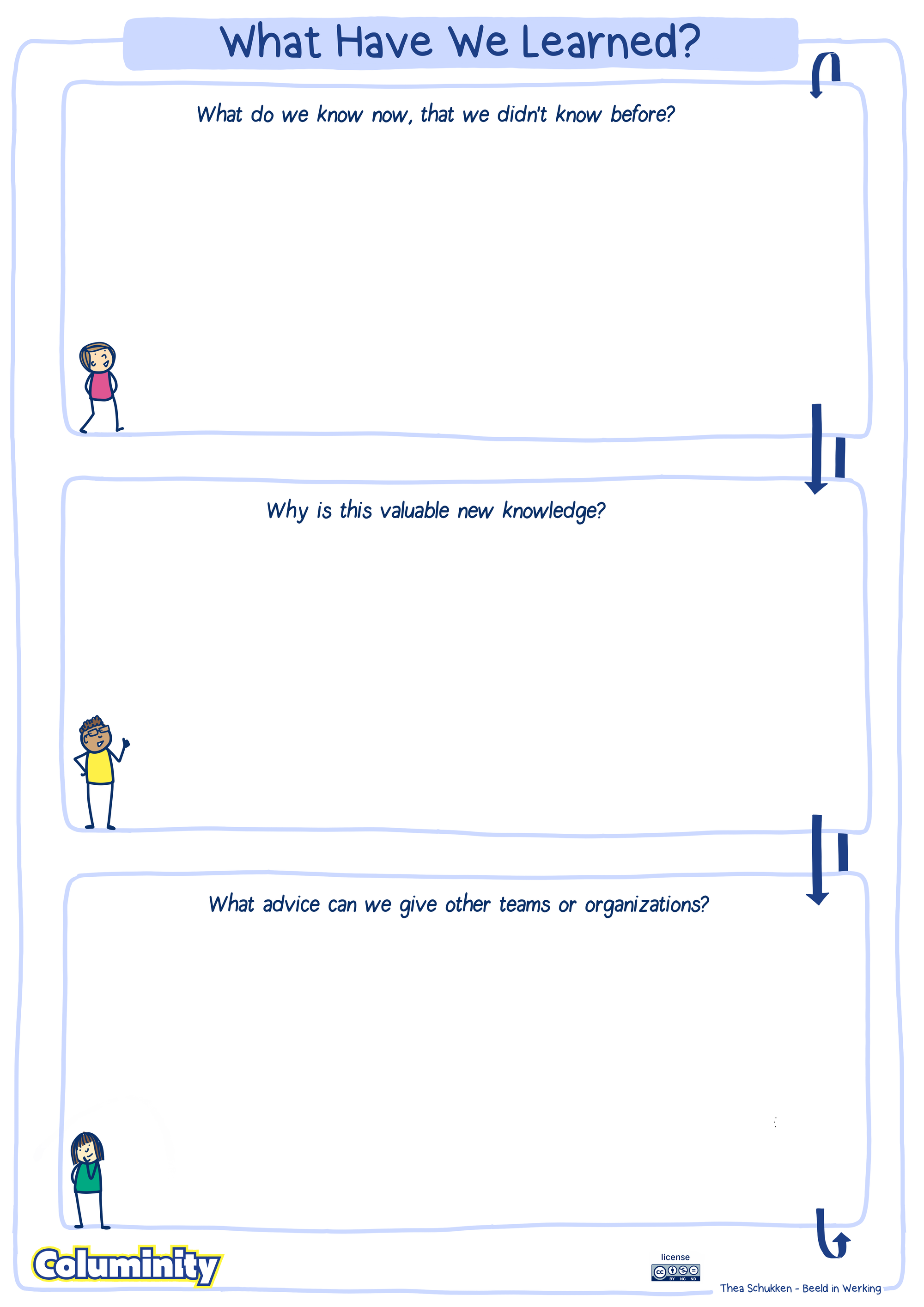
Action Research with Columinity
Curious to try this yourself? Columinity is free for individual teams, and our paid plans unlock deeper insights at the organizational level. One creative option: include Columinity in a workshop package. For example, a one-day workshop combined with a one-month Columinity license for many (or all) teams in your organization. You’ll receive aggregated insights to support data-informed decisions and uncover areas for systemic improvement. Even if you choose not to continue with Columinity afterward, it’s still a valuable investment!
Sounds interesting? Contact us at info@columinity.com to explore the possibilities.


